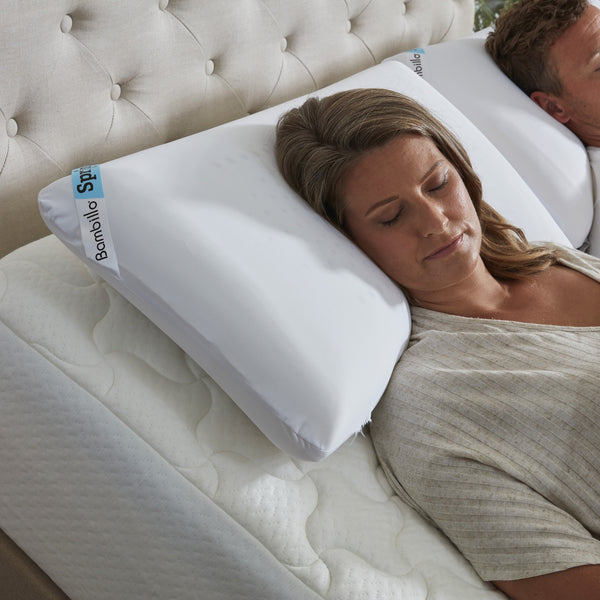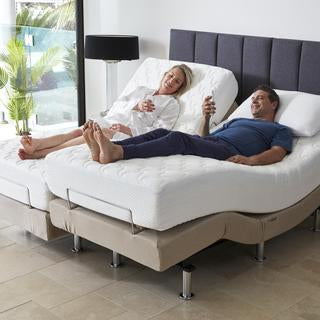Research has provided a greater understanding of how to design an environment conducive to sound sleep. Once you’ve created a restful room, consider these hints to further optimise your sleeping space.
Keep your room cool
Not freezing cold, but not warm either. Body temperature is linked to circadian rhythms, and an overheated room can make for a restless night. While there is no specific temperature recommended for a good night’s sleep, work out a temperature that feels comfortable for you and be mindful that cool is better.
Not freezing cold, but not warm either. Body temperature is linked to circadian rhythms, and an overheated room can make for a restless night. While there is no specific temperature recommended for a good night’s sleep, work out a temperature that feels comfortable for you and be mindful that cool is better.
Keep your room dark
This is one of the most important things you can do to ensure a good night’s sleep. Opt for curtains with a black out lining so you can sleep till you’re ready to wake up naturally, on the weekends at least. This also gives you the option of blacking out your room if you need to take a nap.
This is one of the most important things you can do to ensure a good night’s sleep. Opt for curtains with a black out lining so you can sleep till you’re ready to wake up naturally, on the weekends at least. This also gives you the option of blacking out your room if you need to take a nap.
Keep your room quiet
Some people find it easier to settle down to sleep with a little background noise, but the volume needs to be low. Having a partner who snores can be challenging in this regard, and it’s an issue that needs to be addressed. For some people, a white noise machine may be helpful. These devices emit a gentle static-like sound, or other relaxing sounds such as waves crashing, rain falling or traffic on a motorway.
Some people find it easier to settle down to sleep with a little background noise, but the volume needs to be low. Having a partner who snores can be challenging in this regard, and it’s an issue that needs to be addressed. For some people, a white noise machine may be helpful. These devices emit a gentle static-like sound, or other relaxing sounds such as waves crashing, rain falling or traffic on a motorway.
Sleep on a good quality mattress and pillows
A decent mattress should last about 10 years. Beyond this, it might be time for an upgrade. It’s often said that harder beds are better for your back, but there’s no set rule around this. Work out what feels most comfortable for you. Pillows should be allergen free.
A decent mattress should last about 10 years. Beyond this, it might be time for an upgrade. It’s often said that harder beds are better for your back, but there’s no set rule around this. Work out what feels most comfortable for you. Pillows should be allergen free.
Sleep in clean air
One of the easiest ways to filter the air in your home is with house plants. For the bedroom, pick snake plants, which absorb carbon dioxide and release oxygen during the night.
One of the easiest ways to filter the air in your home is with house plants. For the bedroom, pick snake plants, which absorb carbon dioxide and release oxygen during the night.
Sleep with a partner
Studies have shown that those who sleep with a mate report better quality of sleep than those who sleep alone, even when factors like snoring are taken into consideration.
Studies have shown that those who sleep with a mate report better quality of sleep than those who sleep alone, even when factors like snoring are taken into consideration.
Don’t sleep with children or pets
They’re members of the family, but sharing your bed with children or pets can lead to disturbed nights. Keep them in their own special sleeping quarters.
They’re members of the family, but sharing your bed with children or pets can lead to disturbed nights. Keep them in their own special sleeping quarters.
Practical tips for a great night’s sleep
Maintain a regular sleep/wake schedule
Go to sleep at the same time each night, wake up at the same time each morning
This includes weekends or days off work. If you maintain a consistent sleep schedule, it supports the regulation of your circadian rhythms.
Go to sleep at the same time each night, wake up at the same time each morning
This includes weekends or days off work. If you maintain a consistent sleep schedule, it supports the regulation of your circadian rhythms.
Exercise for at least 30 minutes a day
Any kind of exercise will help you to sleep, but the kind that makes you work up a sweat is best. Avoid vigorous aerobic exercise in the evenings, as it can interfere with sleep. Exercise tires you out, but it also promotes the release of serotonin in the brain, which is the precursor to melatonin, the body’s sleep hormone.
Any kind of exercise will help you to sleep, but the kind that makes you work up a sweat is best. Avoid vigorous aerobic exercise in the evenings, as it can interfere with sleep. Exercise tires you out, but it also promotes the release of serotonin in the brain, which is the precursor to melatonin, the body’s sleep hormone.
Make sure you see the daylight
Exposure to daylight encourages the body to produce melatonin at night time. Getting at least two hours of sunlight a day is optimal. If you’re confined to an office, a lack of natural light can cause daytime drowsiness. Going for a walk in the midday sun can help stave off the “mid-afternoon crash” many people experience between 2pm and 3pm.
Exposure to daylight encourages the body to produce melatonin at night time. Getting at least two hours of sunlight a day is optimal. If you’re confined to an office, a lack of natural light can cause daytime drowsiness. Going for a walk in the midday sun can help stave off the “mid-afternoon crash” many people experience between 2pm and 3pm.
Avoid alcohol and caffeine in the evenings
Alcohol may initially make you feel sleepy, but the process of metabolising it in the body creates blood sugar spikes that can cause wakefulness. Caffeine is a stimulant and should be avoided for 6 hours before bedtime.
Alcohol may initially make you feel sleepy, but the process of metabolising it in the body creates blood sugar spikes that can cause wakefulness. Caffeine is a stimulant and should be avoided for 6 hours before bedtime.
In cold weather, put on warm socks before you go to sleep
Studies have shown that having warm feet can make you fall asleep more quickly.
Studies have shown that having warm feet can make you fall asleep more quickly.
Don’t go to bed until you’re really, really tired
There’s nothing more discouraging than staring at the ceiling, or tossing and turning, when all you want to do is fall asleep. Wait until you’re really tired before you go to bed, and if you’ve been lying awake for more than 20 minutes, get up and do some kind of quiet, non-stimulating activity for a while.
There’s nothing more discouraging than staring at the ceiling, or tossing and turning, when all you want to do is fall asleep. Wait until you’re really tired before you go to bed, and if you’ve been lying awake for more than 20 minutes, get up and do some kind of quiet, non-stimulating activity for a while.
Avoid heavy meals and lots of fluids in the evenings
Indigestion, reflux or simply the natural process of metabolising a big meal can promote wakefulness. Lots of fluids can result in 2am trips to the bathroom. Opt for a light evening meal, and keep drinks of any kind to a minimum.
Indigestion, reflux or simply the natural process of metabolising a big meal can promote wakefulness. Lots of fluids can result in 2am trips to the bathroom. Opt for a light evening meal, and keep drinks of any kind to a minimum.



